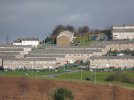First question for Brits. How much American history do you guys learn? From British people I know, they say more is taught now than in the past. Does it vary by county or is education pretty much uniform across the country?
Irish person who has lived in London and Edinburgh.

I was in school in the 1980's and 1990's
In Ireland the main focus in both primary school and secondary school was on Irish history. History was a compulsory subject for me up until the first state exam at about age 15. In the compulsory classes, we got an age appropriate overview of world history as we went through the school system. We got the basics of American history, but for me personally most of the American history I know came from self research. A lot of my self research started from watching or reading historical fiction and then I would find a way to learn about the real life events the historical fiction was inspired by or based on.
In Ireland we have a national curriculum, so every school teaches the same thing no matter the location or who runs the school.
Oh good, I have a ton of questions from movies & TV shows set in Britain, and just general things you read and hear. To start--what you call public school is what we would call private school. You pay to go to it and have to be admitted. Our public school is paid for by taxpayer dollars, and everyone is allowed in. It is the law requiring kids to attend some school until 16 or 18. If you can afford and qualify for private school, you don't have to go to public school. What do you call that which we call public school? Do you feel like they are not a good education?
In Ireland it is similar to America.
Our state schools are funded by the Government but there is no separation of state and church. The majority of state schools in Ireland are run by The Catholic Church.
There are also independent schools, run by an official charity called
Educate Together. This organization was set up to give an alternative option to the State run Catholic schools. They teach the national curriculum with a multidenominational ethos.
There are also a small number of independent Irish language schools, who teach the national curriculum through the Irish language.
The state run schools, Irish language schools and Educate Together schools are free, as they receive funding from The Irish Government and are inspected by The Irish Department of Education.
We also have a number of private fee paying schools. They teach the national curriculum but do not receive funding from The Irish Government and are not inspected by The Irish Department of Education.
In Ireland education is compulsory for all children in from the ages of five / six to sixteen.
To leave school at 16 you must have completed the first state exam called The Junior Cert.
Primary School
- Junior Infants (age 4–5/5–6) (informally known as Low Infants)
- Senior Infants (age 5–6/6–7) (informally known as High Infants)
- First Class (age 6–7/7–8)
- Second Class (age 7–8/8–9)
- Third Class (age 8–9/9–10)
- Fourth Class (age 9–10/10–11)
- Fifth Class (age 10–11/11–12)
- Sixth Class (age 11–12/12–13)
Secondary School
This is split into 2 sections, with an optional transition year in between the two sections. Not all schools offer the transition year and it usually has a limited amount of students.
The Junior Cycle is a three-year programme, culminating in the Junior Certificate examination. The Junior Certificate examination is sat in all subjects (usually 10 or 11) in early-June, directly after the end of Third Year.
- First Year (age 12–13/13–14)
- Second Year (age 13–14/14–15)
- Third Year (age 14–15/15–16)
Transition Year
- Transition Year sometimes called Fourth Year (age 15-16/16-17) – depending on school, this may be compulsory, optional or unavailable.
Senior Cycle
The Senior Cycle is a two-year programme to prepare students for the Leaving Certificate examinations. The Leaving Certificate examinations take place directly after the end of Sixth Year, with the first exam being held on the Wednesday following the June public holiday (the first Monday in June).
- Fifth Year (age 16–18 or age 15–17 if Transition Year is skipped)
- Sixth Year (age 17–19 or age 16–18 if Transition Year is skipped)




 I was in school in the 1980's and 1990's
I was in school in the 1980's and 1990's
